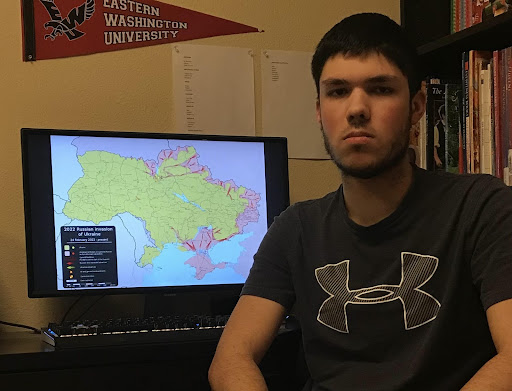Bellarmine’s favorite foreign policy expert explains the Russia-Ukraine war

Noah Wilson looks very serious next to a map of the Russo-Ukrainian War
Senior Noah Wilson, a foreign policy enthusiast with a keen interest in Northern European politics, was interviewed by the Lion journalism staff about the war in Ukraine.

Xavier Nazzal: Tell us how this all began.
Noah Wilson: So, what happened is it started out in 2022, obviously. And believe it or not it actually originally started in spring of 2021, but it hit the media in about fall of that year, because from spring to fall the Russian troop build up on the Ukrainian border was negligible, but in about fall of 2021, US ambassadors and a bunch of different countries started to realize that there were problems going on with a bunch of troop build up at the Ukraine border.
At the time of fall 2022, I believe it was over 50,000. Which was a sizable amount by then and that was when we realized that sometime was starting to go on. This was at the border of Donbass, the party of Ukraine held by Russian separatists. Originally in fall of 2021, we thought that they were trying to take Donbass, because 50,000 soldiers is not enough for an invasion, but the numbers kept rising and rising until about February of this year, when they got to about 125,000.
Nazzal: We’ve seen that from fall of 2021 until very recently, these troops at the Ukrainian border were building and building. Why would [Vladimir] Putin even want to do this? Is it to show his dominance? Is it because historically the USSR contained Ukraine as part of it among other states? Is it because Putin wants to invade Ukraine, because it has a lot of Russian speaking people? What is the reason behind it?
Wilson: Well, there’s a lot of reasons. I’d say there’s three main reasons. Number three, I’m gonna start out with, because it’s least important to Putin and that is that he believes Ukraine is weak enough to invade. The second reason is because there is a large Russian-speaking population in Ukraine and more than just Russian speaking — Russian ethnically. So, he wants to unify those people with Russia.
His number one reason from at least what I’d say is Russia’s economy is going down the drain right now. Russia’s economy is horrible even before the sanctions. And because of Russia’s collapsing economy, Putin basically tried to do something to get a victory for Russia, because Russia really hasn’t had any victories for, like, the last decade, even. And his leadership has been pretty lackluster. He’s got a very low approval rating in Russia, so his decision to invade Ukraine was to try to get more public approval and to boost national spirit for Russia. Obviously, he’s very out of touch with reality and with what’s happening at all right now. I mean this invasion of Ukraine is actually lowering Russian morale.
Nazzal: So, we’ve gone over the pretext for this situation. We’ve gone over why he’s doing it — why Putin wants to invade Ukraine. So, how is he invading Ukraine, because I know that the Ukrainian resistance has been very strong so far. So, what is the offensive strategy and methodology?
Wilson: Their strategies are very clearly indicative of the very old style of warfare and very clearly indicates that Putin is more of a twentieth century leader, because the way he’s been doing this is very similar to World War II. They haven’t made use of guerilla warfare or anything like the Ukrainians have, which is why they have been so successful. Their tanks and their convoys and such all travel in columns of about 5-10 vehicles and that’s how they transport equipment from Russia to temporary Russian bases and from the bases to the battlefields. Typically, that’s not been working, because when they’re transporting it from the Russian bases to the battlefield, they’re traveling in columns, which makes its tanks an easy target. So, that is one of their strategies — vehicle convoys and such.
One of the more effective strategies that they’ve been using is massive bombings in every single major city in Ukraine and that has really been working in the favor of the Russians, because they’ve been able to cripple all major cities in Ukraine right now to the point that some of them aren’t usable at this point.
Nazzal: We’ve all seen videos of the Ukrainians reacting to this. For example, there is a video of an Ukrainian man smoking a cigarette and carrying a tank bomb across the street and tossing it into the woods. Also, in terms of the military’s resistance, the Ukrainians were either switching the road signs or destroying them entirely to throw off the Russian army. A third thing that I want to mention is that there was an Ukrainian island surrounded by Russian battleships, the Russian battleships told the officers to surrender, and the Ukrainian commander told the Russians to do something using profanity. So, how is Ukraine fighting in terms of the strategy of the military and the morale of the people?
Wilson: Well, when it comes to the Ukrainian side of things, they seem to surprisingly have the upper hand in this situation, not in might or numbers, but in terms of the morale of the people and the overall military tactics that Ukrainians use are mostly higher than [that of] the Russians.
The war is basically a Putin decision, so the Russian military is not in support of this and is doing their job. They are just trying to get their paycheck, while the Ukrainians genuinely do want to defend their nation. Most of them are very proud of their nation. Most of them are very proud of their nationality. They are very proud of their ethnicity, so they want to defend their nation to the death — literally to the death, so they will use any and all tactics necessary, especially unconventional tactics to try to confuse the Russians. They are literally trying to do everything they can to get the Russians out.
Nazzal: How are the Russian people reacting to this back home, back in Moscow, back in cities in Russia taking this, because I heard that there have been protests against Putin. Elaborate on this.
Wilson: There have been mass protests in Moscow and Saint Petersburg. Almost every citizen in the Russian Federation is strongly against this invasion. To me, the public outcry is very indicative that this is Putin’s war. He has put himself in an autocratic position where he can pretty much do anything without the peoples permission.
Nazzal: I hear that the Russian military was told that the invasion was a drill? Is this true?
Wilson: Yes, it is correct. They were informed by Putin and his side men that this would be a special military operation into the Donbass region that was already held by Russian separatists.
Nazzal: So, India came out as neutral in the conflict besides American sanctions and Europe, which was more reluctant? How is the UK and France and China for example?
Wilson: A majority of the world’s nations are against this. Some nations have supported Russia’s decision to invade Ukraine and even fewer that have declared neutrality namely India and the United Arab Emirates. The few that have supported this decision [are] North Korea, just because they’re anti-West, Syria has been in support of this, because Bashir Al-Asad, has ties to Putin, and China, but very hesitantly, who doesn’t entirely surprise me. Nicaragua and Venezuela [are fully in support of it]. Basically all of NATO, basically all of the Latin World, all of Africa, and almost all of Asia.
Nazzal: My final question is how do you see this ending? Do you think that there will be a nuclear war that leaves nothing left, do you think that Putin will invade all of Ukraine and then stop; what is your prediction to the end of the Russo-Ukrainian War?
Wilson: As far as it goes outside of Ukraine, I cannot say what will happen. I do not think that it will end in a nuclear war. I think that things will really start to go downhill, if major Western nations start declaring war on Russia. There may be a possible attempt by Putin to launch an invasion of the Baltics and Finland, which I initially did not think that [Putin] would do, but after recent threats from Putin, with possibly trying to join NATO, that does not seem too distant, unfortunately. There is reason to think that the invasion of the Baltics and Finland could take place, but it is a bit too far out. If Ukraine does capitulate, that is something we may have to take into mind.
There you have it. Straight from Bellarmine’s favorite Northern European foreign policy expert.

Xavier Nazzal is a senior who serves as the Executive Online Editor for the Lion Journalism 2022 - 2023 school year. Among other things, Nazzal participates...
